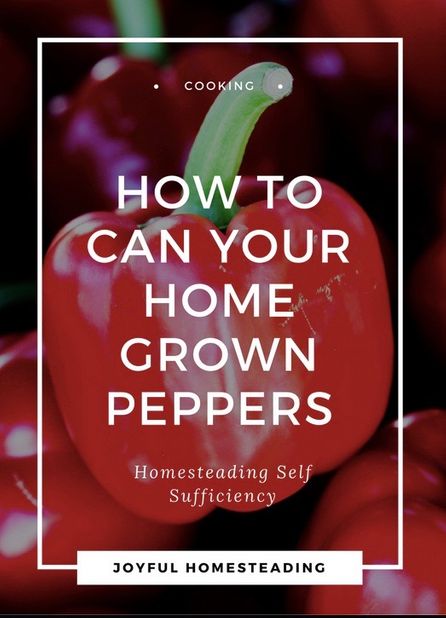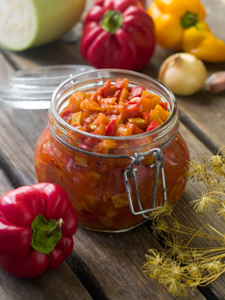Canning Peppers to Make the
Most of Your Bountiful Garden
Canning peppers is a great way to make the most of the extra
peppers you have growing in your garden.
I love adding sweet banana peppers to my salad, and for
many, nachos just aren't complete without a few jalapeno peppers added in. (Just a few, thanks. I'm a wimp when it comes to hot, spicy food!)
But beware! Peppers are a low acid food, which means you will
need to use a pressure cooker. Don't use a hot water bath to can peppers. It won't get hot enough to can them safely.

Preserving Peppers
Preserving peppers by canning is fairly simple. Wash your peppers well and place them in boiling water, allowing them to boil for three minutes. Then drain your peppers and immediately put them in sterilized, quart-sized canning jars along with one tablespoon of vinegar and half a teaspoon of salt in each jar.
Prepare your canning lids according to the instructions on the package the lids came in. Place the lids on the jars and gently screw the bands on.
Add about one inch of hot water to your pressure cooker. Then place the jars in your pressure cooker and cook them at 10 pounds of pressure for 35 minutes. Allow the cooker to completely cool before removing the lid.
Use a canning jar lifter to remove the jars (you can see one here), and set them on a cooling rack until they are completely cool.
Make sure the jars are completely sealed before storing in your cupboard. Gently remove the bands and then try to pick up the jar by the lid alone. If it is sealed properly, the lid won't come off.
What If I Don't Have a Canner?
While canning peppers is one way to store those extra peppers for the long term, another excellent way to preserve them is by using vinegar. The acetic acid in the vinegar keeps microorganisms from growing, so the peppers don't spoil.
Using vinegar to preserve food is quick and easy, and has been a time-honored way to store food for centuries. Plus, it's a way to keep more nutrients in your food. Peppers are loaded with vitamin C, thiamine, vitamin B6, beta carotene, and folic acid.

You lose a lot of those nutrients when you cook peppers in a pressure cooker.
Preserve those peppers in vinegar instead by chopping your peppers and placing them in a large bowl. Add a generous amount of salt and then cover them with non-chlorinated water, such as filtered water. Soak the peppers overnight and in the morning, spread the peppers on a cloth to drain.
Pack the peppers in a quart-size jar and cover them with wine vinegar. Put the lid and band on the jars and store in your cupboard - it's that simple. The peppers will be ready to eat in a week. If unopened, these peppers should last for several months. After opening a jar, you need to store it in your refrigerator.
By the way, this recipe comes from the book, Preserving Food without Freezing or Canning: Traditional Techniques Using Salt, Oil, Sugar, Alcohol, Vinegar, Drying, Cold Storage, and Lactic Fermentation. It's an excellent reference if you want to learn how to preserve food without having to rely on electricity.
One Woman's Memories of Canning Peppers
Canning peppers and cabbages, tomatoes and apples in a hot country kitchen brings more than just great preserves. It also builds happy childhood memories. Here is Karen's story of living with her grandparents.
Canning Peppers and Other Childhood Memories
When I was a young girl my family moved in with my grandparents. My grandmother was raised to believe that you get all you can from the land, and then go to the supermarket for the rest. She grew a garden every year. She tried to teach us how to can and preserve the vegetables and fruit that she grew each year.
I remember being petrified of the pressure cooker. Everyone has heard the story of a pressure cooker blowing up and maiming or killing the unsuspecting user. The story was always in the back of my mind when she worked with us getting her canning finished.
The year that we were there I learned how to can tomatoes. I can never forget how hot the kitchen was during canning season. The tomatoes had to be cooked and then we had to strain them to get the tomato juice that she wanted to can.
Canning Peppers And Pickled Lily
We had apples to make applesauce and apple butter. She made homemade sweet pickles. My favorite was her pickled lily - at least that is what we called it. It was actually a relish of hot peppers and cabbage.
I remember her telling us we needed to use gloves for that one. She said that when she was a girl their hands would get rashes from the peppers because they did not have gloves to cut the peppers back then. I could not imagine cutting those hot peppers without the protection of gloves. She is a very tough lady.
Canning Peppers And Making Molasses
During that time of year we also helped my great uncle with his sugar cane crop. Every year he would make molasses and the whole family would come to his fields to help him cut the cane and process it into molasses. The smell of that hot molasses was wonderful. He would give us a stick of sugar cane covered in molasses to reward us for helping him. I would love to have one of those now. They were delicious.
I learned many things that summer while at my grandparents, but I am sad to say that I do not use the skills she taught me. I wish I could remember how to do all the things she showed us. I am sure it would make me a healthier person if I made my own canned goods.
My mom still cans every year. I wish I had the time to help her, maybe I could remember what my grandmother tried to teach me about canning pepper and other things all those years ago.
Karen










New! Comments
Have your say about what you just read! Leave me a comment in the box below.